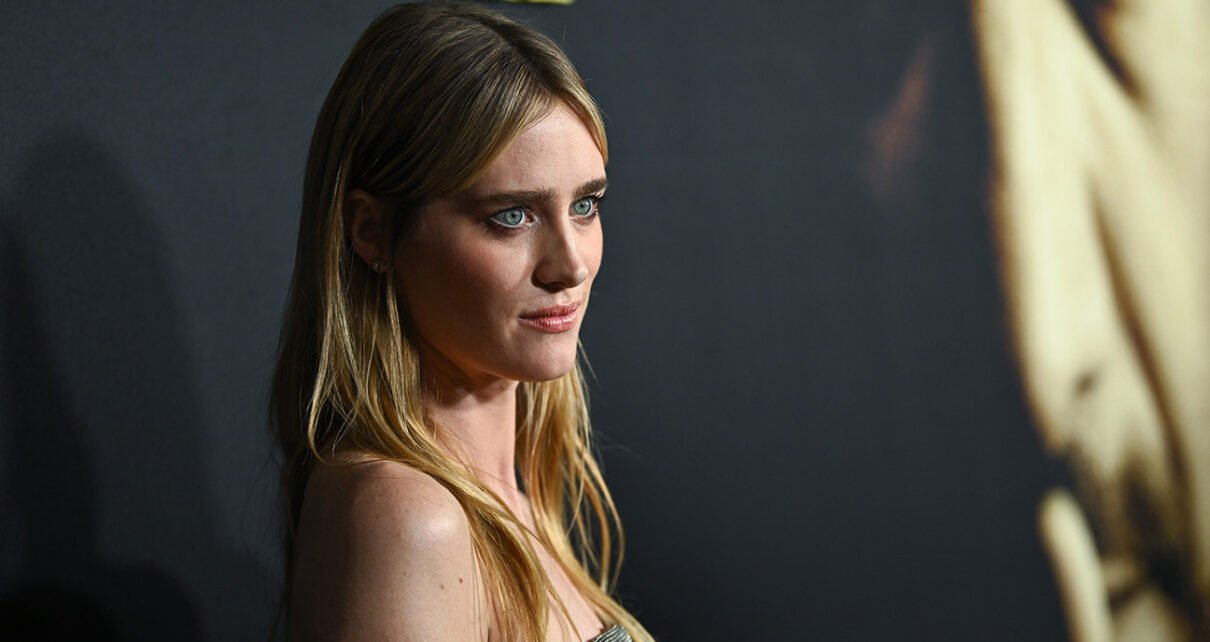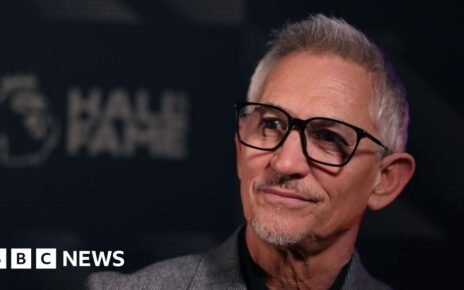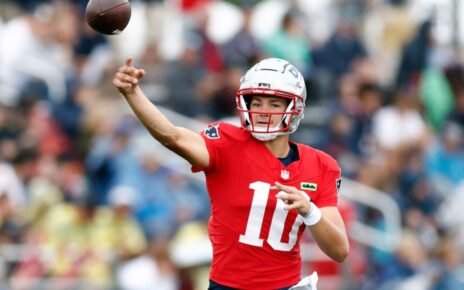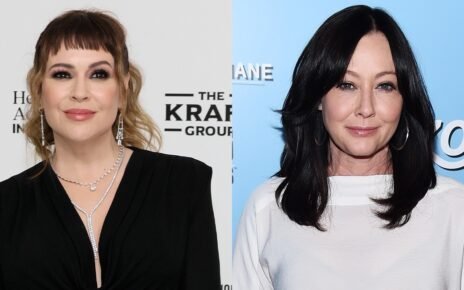A decade ago, Mackenzie Davis’ breakout role as Cameron Howe on AMC’s Halt and Catch Fire had just wrapped its well received but criminally underseen first season. Fortunately for Halt, the network’s flagship shows, Mad Men and Breaking Bad, had just concluded their runs, and AMC, in the interest of creating new critical darlings, decided to invest further in Christopher Cantwell and Christopher C. Rogers’ underviewed drama series, something that’s a rarity in this day and age of increasingly impatient networks, studios and streamers.
Davis played a gifted young computer programmer who was at the forefront of the personal computing and internet revolutions in the ’80s and ’90s, and throughout the rest of the series, she had an off-and-on romantic relationship with Lee Pace’s entrepreneurial visionary, Joe MacMillan. Alongside their initially married friends and intermittent business partners, Gordon (Scoot McNairy) and Donna Clark (Kerry Bishé), the characters’ friendships, relationships and marriages were tested to the nth degree amid the fast-changing marketplace they inhabited.
AMC’s belief in the series paid off, critically, as the show went from a well reviewed season one to a genuine critical favorite as of seasons two through four. The ratings never took off like they did for Breaking Bad in its later seasons, but the network was celebrated for prioritizing quality above all else.
That brings us to James Watkins’ reimagining of Christian Tafdrup’s psychological horror film, Speak No Evil, which reunites Halt’s Davis and McNairy as a married couple. Having played friends and colleagues with a sibling-like dynamic on their former show, the first trailer for the Blumhouse-Universal film caused quite an uproar among the Halt fan base, which, thanks to streamers like Netflix, has grown considerably since wrapping in 2017.
Davis admits that this new dynamic with McNairy was a little uncomfortable at first, but that early discomfort likely served their characters well since they’re portraying a married couple at a particularly rocky time.
“There was something that felt sort of incestuous or perverse about it when I was like, ‘Oh, we’re going to kiss on the lips? But that’s Donna’s husband.’ But then it was fine,” Davis tells The Hollywood Reporter.
Similar to the 2022 Danish film, Watkins’ film follows a similar premise, as Louise (Davis) and Ben (McNairy) Dalton visit the English countryside farmhouse of Paddy (James McAvoy) and Ciara (Aisling Franciosi) after meeting each other’s families during an Italian vacation. The getaway soon goes very, very wrong for the Dalton family, culminating in a very different ending for the American version.
Tafdrup’s film has one of the most gut-wrenching conclusions in recent memory, and while Watkins and co. went a more hopeful way, Davis insists that she wouldn’t have been scared off had they opted to do something similar to the Danish predecessor.
“It’s really ballsy, but … I don’t think it would’ve felt as true to this movie, because we’re not playing with politeness in quite the same way that Christian [Tafdrup] was in his,” Davis says. “We have different cultural mores and norms to exploit, but yeah, I think that [original ending] was cool and brave and sick.”
In a previous conversation with yours truly for Davis’ other critically acclaimed series, Station Eleven, Davis expressed how much she wanted to play younger Furiosa in George Miller’s Furiosa: A Mad Max Saga. After all, she’d already played a younger version of a Charlize Theron character in Diablo Cody and Jason Reitman’s 2018 gem, Tully. But the role had already gone to Anya Taylor-Joy, and while she’s a big fan of the actor, Davis admitted that she felt some temporary frustration at the time of the announcement. Fast forward to the present, Davis had no problem enjoying the now-released film, including Taylor-Joy’s well regarded performance.
“I thought it was amazing. I loved it. I love George Miller, and I think Anya was incredible. I was maybe too open about wanting that part that it’s now coming up again, but it was never an option,” Davis says. “I just like that stoic warrior that Charlie created. I think it’s an incredible character, and I thought Anya added a lot to her.”
Below, during a recent conversation with THR, Davis also discusses her uncertainty over one of her most impressive scenes in Speak No Evil.
Well, let’s not bury the lede. When I saw the Speak No Evil (2024) trailer for the first time, the image of Halt and Catch Fire’s Cameron and Gordon as a married couple caused me to short circuit.
(Laughs.) It’s the fanfic everybody was asking for.
How did this reunion with Scoot unfold from your perspective?
I don’t think James Watkins has ever watched Halt and Catch Fire [in totality], so it was just a complete surprise. I almost feel you wouldn’t want to do that; it’s a cult show. So it just happened.

Kerry Bishé, Scoot McNairy, Lee Pace, Mackenzie Davis and Mark O’Brien in Halt and Catch Fire
AMC
Did you gently break the news to Halt co-stars Lee Pace and Kerry Bishé that their romantic partners on screen were now fictionally married?
Yeah, I sent them hand-drawn letters in the mail, being like, “Your worst fears have come true.”
When the trailer dropped, was there a lot of commotion? Did a bunch of Halt people reach out?
No, not a single one. (Laughs.) I haven’t heard from anyone.
Apparently, I’m the only one making a fuss about it.
I know, but I appreciate that you are.
Oddly enough, I talked to your Halt producer Melissa Bernstein recently, and while she’s very excited to see the movie, she thinks Lee and Kerry should even the score in their own movie.
Yeah, I would like that.
So maybe you’ve started a very deep game here.
I’m glad. I look forward to the next pairing trying to outdo us.
Cam and Gordon were friends and colleagues, but they were also like siblings at times. They’d bicker playing video games, or she’d flick rubber bands at him. So how long did it take for that old dynamic to wear off?
I guess immediately, because we weren’t really like that in real life. I did have this younger sister-type admiration for him as an actor. When we first started working together, Halt was one of my first jobs and he was just so great. So it felt very student-teacher a little bit, not that he was doing anything like that, but I just felt that way towards him. So it was fun to meet as adults, and there was something that felt sort of incestuous or perverse about it when I was like, “Oh, we’re going to kiss on the lips? But that’s Donna’s husband.” (Laughs.) But then it was fine.

Agnes Dalton (Alix West Lefler), Louise Dalton (Mackenzie Davis) and Ben Dalton (Scoot McNairy) in Speak No Evil.
Susie Allnutt/Universal Pictures and Blumhouse
I suppose any awkwardness between you two would’ve been helpful since these characters aren’t on the same page right now.
Yeah, I think so. They’re not in the throes of a passionate romance. They are very much at odds with where they’re at. So, as they say, use it.
You’ve played characters who look after children, but was this your first proper experience playing a mother?
There’s another [2024] movie called Swimming Home where I played the mother to a 16-year-old, and I’m currently playing the mother to a 16-year-old. And let me tell you, going from not being able to play 32 to suddenly being the mother of 16-year-olds is quite the leap.

L to R: Louise Dalton (Mackenzie Davis) and Agnes Dalton (Alix West Lefler) in Speak No Evil.
Susie Allnutt/Universal Pictures and Blumhouse
The original Danish film’s ending is so memorably bleak, and I feel like it’s something that should only be done once, so I’m glad you went your own way. That said, if you were asked to recreate that nightmarish ending, do you think you still would’ve signed on? Would you have wanted to recreate that?
Yeah!
Really!?
Yeah, I think it’s cool. It’s really ballsy, but I get why it doesn’t work for our movie. It’s true to the original, and I don’t think it would’ve felt as true to this movie, because we’re not playing with politeness in quite the same way that Christian [Tafdrup] was in his. We have different cultural mores and norms to exploit, but yeah, I think that [original ending] was cool and brave and sick.
As someone who washes his sheets every Sunday like clockwork, I would’ve left the farmhouse as soon as I saw the bedding conditions. When would you have pulled the plug?
I think that’s correct. Seeing the bedsheets would be so uncomfortable, so I’d make up a very big dramatic lie and rush out of the house on the phone as though somebody’s died. And then I’d get in the car and go.
One of the creepiest scenes in the original was the shower scene, and while it didn’t make the cut, I heard that you actually shot it.
We did shoot it! I liked it. [Louise] wasn’t getting slashed, but it felt very Psycho just being in the shower while he was doing his business. I’m not sure why it didn’t make the cut.
Would that have just been too many red flags for Louise?
Yeah, maybe. It was getting to a point where you’ve got to go. That’s the sort of cultural DNA that differentiates these two movies. You do feel like an Americanness in Louise. She’s trying to go. She’s not trying to placate. She is trying to make sure her husband’s happy and not just forge ahead with what she wants all the time, but I do think she has this frontier attitude of, “Let’s just take care of the family.”
Louise and Ben each have their own individual fears. Unlike him, Louise is afraid to cliff jump, and the scene ends without her doing so. Did Mackenzie Davis still make the jump on the day?
Mackenzie Davis would [cliff jump], but Mackenzie Davis didn’t. If I was like, “Well, I’ll just get wet even though you guys weren’t planning on it,” that spontaneity can really derail an entire shooting day for people.
Has this movie affected your desire to be a host or houseguest?
I love hosting and then I love people leaving. I love having a really elaborate dinner party that takes me a few days to put together. We all eat and drink all night, and then when it’s time to go, I don’t want anyone to help with the dishes. I want to have this hour by myself while I clean up and have peace. So I like that sort of binary a lot, and then nothing.

Louise Dalton (Mackenzie Davis) in Speak No Evil, directed by James Watkins.
Susie Allnutt/Universal Pictures and Blumhouse
Louise becomes quite active as the movie goes along, and there ends up being a bit of action. Could you feel any remnants of Terminator: Dark Fate’s Grace during any of that?
Yeah, surprisingly. Grace is about the furthest away from me that you can get in terms of ability, gracefulness and physical acumen, but I did have some firearm training stuff and a type of running that started coming [back] in. James was so great about really insisting on an ineptitude in these characters. They’re not good at this. Everything is new, and none of this is familiar. So it was good direction to keep pushing away from anything that revealed a Terminator past.
After Halt and Catch Fire, Black Mirror and Station Eleven, you’ve set a very high bar for yourself on television. Has that made you even more particular about what series you commit to now?
Yeah, I think so — in the sense that they just take a long time to film, and if you’re going to be doing that, you want to really love something. I’m making a TV show right now called The Undertow, but I hope it’s also good. I hope it lives in that world. I think it’s pretty special. If you end up doing it for six months or multiple seasons, you really want to love the people you’re making it with and the material and the reason why.
So I spoke to Tully writer Diablo Cody earlier this year about your favorite subject of Furiosa, and because of your role in Tully, her eyes also widened at what could have been. And this is nothing against Anya Taylor-Joy; she was great in the role of Furiosa. It’s just that us Tully fans already saw you play younger Charlize so effortlessly. Could you bring yourself to watch that movie, or is it still too soon?
No, I saw it in theaters. I thought it was amazing. I loved it. I love George Miller, and I think Anya was incredible. I was maybe too open about wanting that part that it’s now coming up again, but it was never an option. I just like that stoic warrior that Charlie created. I think it’s an incredible character, and I thought Anya added a lot to her.
It was partially my fault that you were too open about wanting the role of Furiosa.
I know! I knew it was you! I was like, “That Hollywood Reporter.” (Laughs.)
“I’m going to Variety next time.”
(Laughs.)
Every job informs the next job, so what have you carried with you from Speak No Evil?
Speak No Evil satisfied a craving to play a woman with a different type of power or with a less immediately available or articulated power that ended up growing. I thought that would be really interesting. To me, it’s less what you take with you and more, “What role do you do next that’s not a reaction to this one? What have you satisfied with this to where you now need something opposite or different to satisfy?”
To me, the movie is about the virtues of therapy: the stuffed animal, the primal scream scene, Louise’s confession. Of course, the latter served a dual purpose, but I thought it was your finest scene in the film.
That’s so funny. I struggled with that [confession] scene so much. I kept wanting to rewrite it. I was genuinely obsessed with it. I just couldn’t figure it out. It didn’t make sense to me. I didn’t understand the logic of it. I didn’t know why she was doing it. I could not do it. And then maybe all the anxiety I had over it — and how much I thought about what I couldn’t do with it — fed into the frustration in the scene. So, at a certain point, we just had to shoot it, and I had to find a way to make it make sense to me, which I did as much as possible. But I definitely left that day being like, “Oh my God, that is going to be so horrible when it comes to the final cut of the movie.” So, anyway, thank you. You’re forgiven for the Furiosa thing. (Laughs.)
Lastly, what single day on Speak No Evil will you likely recall many decades from now?
They had a chicken wrangler on set one day, and it said chicken wrangler on the back of her uniform. She was carrying two chickens on either side of her arm and their bums were poking out the back. So it just made me laugh, and I think about that image a lot.
***
Speak No Evil opens in movie theaters on Sept. 13.




